City of Sacramento to Host Ribbon-Cutting for SAFE Credit Union Convention Center
By R.V. Baugus
Sacramento’s newly named SAFE Credit Union Convention Center will host a ribbon-cutting ceremony at 10 am on Thursday, June 3.
Speakers include Congresswoman Doris Matsui, Mayor Darrell Steinberg, Councilwoman Katie Valenzuela – District 4, President & CEO of SAFE Credit Union – Dave Roughton, and President & CEO of Visit Sacramento – Mike Testa.
The event caps an extreme makeover led by IAVM member Jodi Ulich, Convention & Cultural Services Director 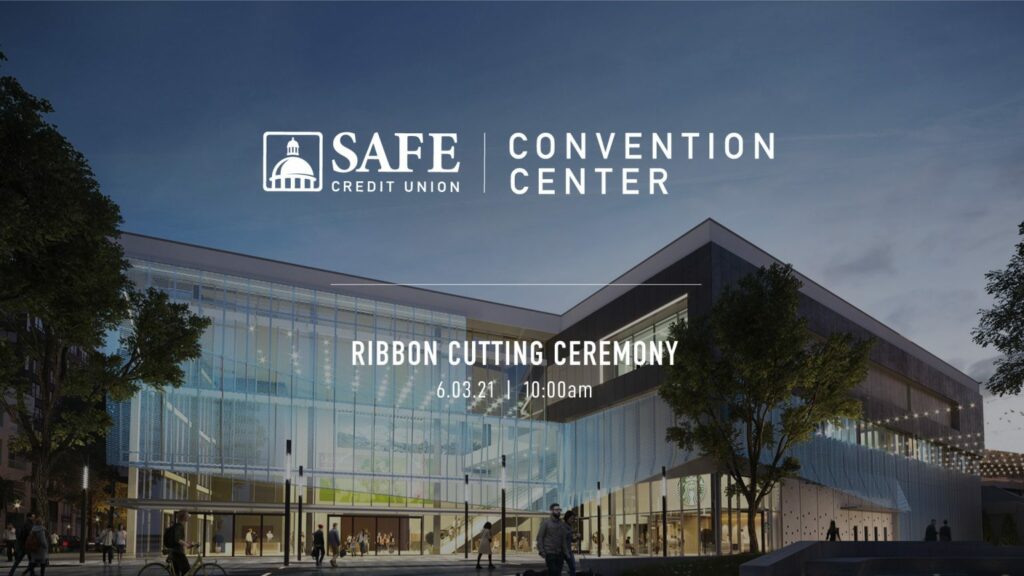 for the City of Sacramento. Formerly the Sacramento Convention Center, this venue features a dynamic center for conventions, meetings, and cultural experiences. Despite the effects of COVID-19, the expansion and renovation construction of the convention center continued throughout 2020 to ensure an early 2021 opening. Customers will enjoy an expanded exhibit hall, new ballroom, additional meeting rooms and a new outdoor plaza. Also, the convention center received its GBAC (Global Biorisk Advisory Council) STAR Facility Accreditation. GBAC certification demonstrates a commitment to ensuring a clean, safe, and healthy environment for everyone using or working in the facility.
for the City of Sacramento. Formerly the Sacramento Convention Center, this venue features a dynamic center for conventions, meetings, and cultural experiences. Despite the effects of COVID-19, the expansion and renovation construction of the convention center continued throughout 2020 to ensure an early 2021 opening. Customers will enjoy an expanded exhibit hall, new ballroom, additional meeting rooms and a new outdoor plaza. Also, the convention center received its GBAC (Global Biorisk Advisory Council) STAR Facility Accreditation. GBAC certification demonstrates a commitment to ensuring a clean, safe, and healthy environment for everyone using or working in the facility.
To get a peek about the project and ribbon-cutting, click here.
College Park Center at UT Arlington is Certified Sensory Inclusive
By Jonathan Carroll
College Park Center at The University of Texas at Arlington has partnered with KultureCity to make the arena and all its programs and events sensory inclusive. This new initiative will promote an accommodating and positive experience for all guests and fans with sensory needs. College Park Center is the first WNBA venue and first university venue in Texas to be certified sensory inclusive with KultureCity.
“Sporting and entertainment events are by nature high energy experiences, but in the moment, it is 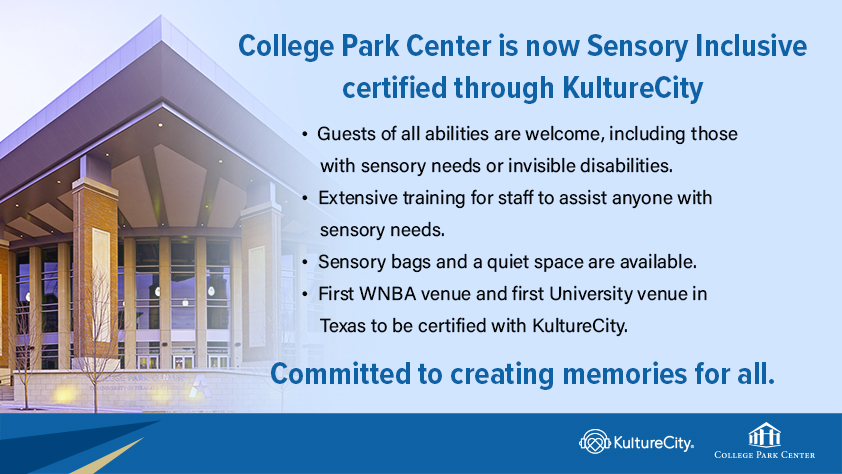 important we understand the excitement, noise level, and visual elements can be over stimulating for some,” states Jeff Davis, executive director of College Park Center. “I am thrilled that our entire staff has embraced this initiative with KultureCity, and they are committed to creating welcoming and inclusive experiences for all of our guests.”
important we understand the excitement, noise level, and visual elements can be over stimulating for some,” states Jeff Davis, executive director of College Park Center. “I am thrilled that our entire staff has embraced this initiative with KultureCity, and they are committed to creating welcoming and inclusive experiences for all of our guests.”
The certification process entailed the staff at College Park Center being trained by leading medical professionals on how to recognize those guests and fans with sensory needs and how to handle a sensory overload situation. Sensory bags, equipped with noise canceling headphones (provided by Puro Sound Labs), fidget tools, verbal cue cards (produced in conjunction with Boardmaker) and weighted lap pads will be available for check out for guests feeling overwhelmed by the environment.
Sensory sensitivities or challenges with sensory regulation are often experienced by individuals with autism, dementia, PTSD and other similar conditions. One of the major barriers for these individuals is sensitivity to over stimulation and noise, which is an enormous part of the environment in a venue hosting live concerts, sports and other events. With its new certification, College Park Center is now better prepared to assist guests with sensory sensitivities in having the most comfortable and accommodating experience possible.
“To know that you soon will be able to see families attend a basketball game, a true community binding experience, with their loved ones who have a sensory challenge and who were not able to previously attend, is truly a heartwarming moment. Our communities are what shapes our lives and to know that College Park Center is willing to go the extra mile to ensure that everyone, no matter their ability, is included in their community is amazing,” said Dr. Julian Maha, Co-Founder, KultureCity.
Prior to attending an event, families can download the free KultureCity app where they can view what sensory features are available and where to access them. Guests can also use the app to view the Social Story which will provide a preview of what to expect while enjoying an event at College Park Center.
Jonathan Carroll is Assistant Director, Event and Venue Marketing, Special Event Facilities.
Coachella Valley Arena Gains Approval for Southern California Region
The Riverside County Board of Supervisors have given their unanimous approval to Coachella Valley Arena, an Oak View Group (OVG) project, stating that it has the potential to be a “game changer” for the Southern California region.
The Board of Supervisors voted 5-0 in favor, which plans to deliver a privately-funded sports and 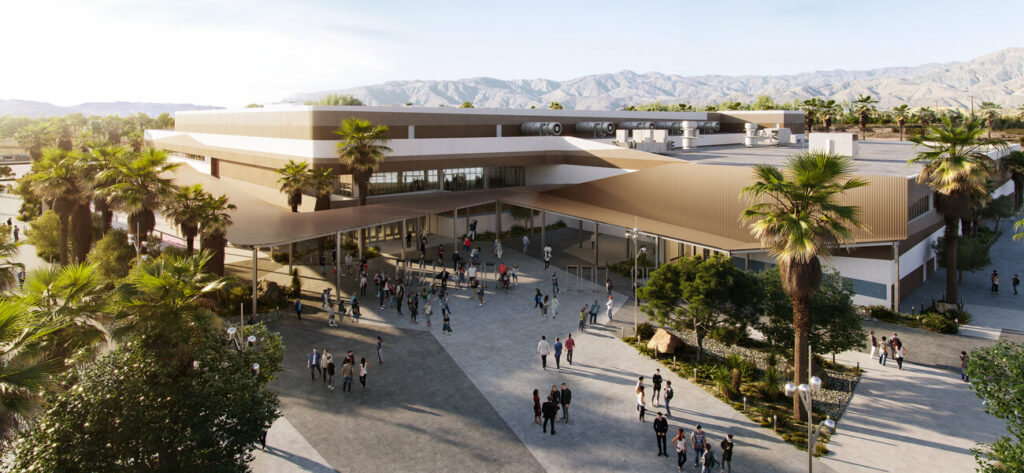 entertainment venue in Thousand Palms that will be the home of NHL expansion ice hockey franchise Seattle Kraken’s American Hockey League (AHL) affiliate team.
entertainment venue in Thousand Palms that will be the home of NHL expansion ice hockey franchise Seattle Kraken’s American Hockey League (AHL) affiliate team.
OVG is building the Coachella Valley Arena on 43.35 acres of land owned by the Berger Foundation. The arena, plus a training facility, will cover more than 300,000 square feet and feature 11,000-plus seats.
After the vote, Supervisor V. Manuel Perez, who represents eastern Riverside County, said: “This is, in my opinion, a game changer for our county, in the Fourth District and even more so, for Thousand Palms, an area that has struggled for a very long time.
“The fact that this is going to bring $11m in state and local tax revenues for our county and will be helpful to the immediate area, that’s why we have so much support for this project.
“There are so many reasons why this is so important, one that I would like to express is the community benefit aspect, especially that our schools and our youth will have access. With California State University, San Bernardino Palm Desert Campus down the street, it will provide jobs, part-time and full-time jobs for our students.”
According to an OVG study, in addition to another commissioned by the Greater Palm Springs Convention & Visitors Bureau, the arena’s economic impact is projected at $108m annual direct spending from visitors and $141m in business spending. The project is also expected to create 1,400 jobs from construction of the arena, and over 1,500 positions once opened.
OVG in September announced fresh plans for the arena after revising the project. In 2019, OVG and Seattle Kraken, which will enter the NHL in 2021, were awarded an AHL expansion franchise and the team had originally been due to play at a new arena on the Agua Caliente Indian Reservation in Palm Springs.
Groundbreaking for the new arena was postponed back in February 2020 due to “extenuating circumstances” and a new direction was revealed for the arena, which will be situated near the Classic Club golf course and not downtown Palm Springs. OVG had originally partnered with the Agua Caliente Band of Cahuilla Indians on the arena project but the group is no longer involved.
Commenting on Riverside County’s approval, Tim Leiweke, CEO of Oak View Group, said: “We would like to express our gratitude to Riverside County and Supervisor Perez as well as many others for their ongoing support in bringing a world-class arena to the Coachella Valley.
“As we enter the construction phase of the project, we will see the creation of nearly 1,400 jobs and more than $230m of economic output to Riverside County, which will provide a significant financial boost to stimulating, supporting, and sustaining the local economy.
“We continue to be committed to the community and in making Coachella Valley Arena a major destination for the biggest artists, concerts, and sporting events in the world, and are pleased the arena, which comes at no cost to taxpayers, will have such a positive, life-changing impact for the entire Valley.”
The Coachella Valley Arena is expected to break ground soon and open in late 2022.
Ungerboeck and EventBooking Merge to Better Serve the Event Industry
By Stacie Bauer and Kalyn Sisco
Ungerboeck and EventBooking, two leading software providers of event and venue management tools, today announced a merger that will enable the unified company to offer customers an integrated set of capabilities that further enhance the world-class solutions they provide today. The consolidation will provide customers with expedited technology enhancements and accelerated innovation, while continuing the focus on customer success.
With the backing of Cove Hill Partners, these two leaders bring their combination of over 50 years of 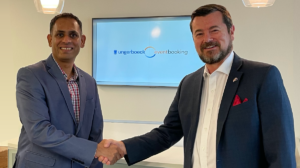 experience together to power the events world in ways never before possible. Manish Chandak of Ungerboeck will serve as President and CEO, and Steve Mackenzie of EventBooking will serve as Executive Vice President.
experience together to power the events world in ways never before possible. Manish Chandak of Ungerboeck will serve as President and CEO, and Steve Mackenzie of EventBooking will serve as Executive Vice President.
“Together, we unify our efforts to provide easy-to-learn and powerful products to drive the industry forward, all while we marry the aspects that clients love about each,” Mackenzie said. “And, of course, the biggest focus will always be on service and ensuring we continue to set the standard in this area.”
While Ungerboeck and EventBooking have developed similar offerings in the past, they’ve always shared the same mission: driving innovation for the success of their customers. Now, under one company with one set of values and a shared roadmap, the unified team can focus on propelling their clients’ business to new levels and help the entire events world achieve new heights.
Brad Mayne, CVE, IAVM President and CEO, said, “IAVM is delighted with the news of this merger. Not only have Ungerboeck and EventBooking been long-standing IAVM members, but they have also contributed immensely to areas such as our education and diversity initiatives that make the lives of industry professionals better. I’m looking forward to the innovation and service levels that this merge will bring to our members.”
“This is the best way to come out the pandemic as the industry expects technology-driven efficiencies and new attendee experiences,” Chandak said. “We could not have found a better growth equity firm than Cove Hill Partners as they share our values and mission. Adding EventBooking to this group is the perfect trifecta to accelerate us into the future as the world’s event software.”
William Blair advised Ungerboeck, and Raymond James advised Cove Hill Partners on the transaction.
Stacie Bauer is with Ungerboeck and Kalyn Sisco is with EventBooking.
Pictured: Manish Chandak, Ungerboeck, and Steve Mackenzie, EventBooking.
IAVM Veteran Member Wayne Coleman Featured in Newspaper Column, Also Tosses First Pitch at Atlanta Braves Game
By R.V. Baugus
The following appeared in the May 9 issue of The Republican, the newspaper in Springfield, Massachusetts, regarding IAVM long-time member Wayne Coleman. Wayne happens to be a favorite personal friend of mine, and it is an honor to share his story below. By the way, Wayne said that his first pitch at the Atlanta Braves’ 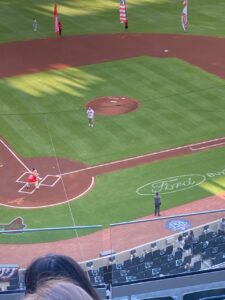 baseball game “short-hopped” mascot Blooper. One of the very few “E’s” we can put on your baseball scorecard, Wayne.
baseball game “short-hopped” mascot Blooper. One of the very few “E’s” we can put on your baseball scorecard, Wayne.
Piping Up
Pregame ceremonies for the Atlanta Braves’ home opener on April 9 included a rendition of “Amazing Grace,”
played by Wayne Coleman, a bagpiper from Springfield.
As he played the pipes, Coleman stood in center field, in front of a “44” sign that had been cut into the turf in honor of Hank Aaron, the National Baseball Hall of Famer who died on Jan. 22 at the age of 86. Aaron
wore No. 44 as he played 23 seasons in the major leagues, 21 of them in the Braves organization.
Coleman, a graduate of Springfield Classical High School, is a third-generation bagpiper. His father, Harold Coleman, and his grandfather, James Coleman, played in the Springfield Kiltie Band, which was established in 1917 and is still active.
“This marks my 39th year as a piper and my 12th time piping on the field at a Braves game. Professionally, I’ve piped coast to coast,” Coleman said. He played the bagpipes in accompaniment to Faith Hill when she sang the National Anthem at Super Bowl XXXIV in 2000. “That was quite an audience for a piper, or any
performer,” Coleman said of the Super Bowl.
He has been performing professionally in Atlanta since 1983. Wayne plays his father’s pipes, a set of Lawries with traditional army turnings He has the original receipt from Glasgow in 1937.
He began music lessons at the age of 5 and studied classical, popular, and jazz piano through high school. He continues to take bi-weekly pipe lessons and attended two summers at the Balmoral School of Piping and Drumming.
Now a resident of Stone Mountain, Georgia, Coleman is a Braves season-tickets holder and has served as
president of the Atlanta Braves booster club. His love of baseball goes back to his teen years, when he served two summers as batboy for the Springfield Giants of the Eastern League.
Do you want to receive a Front Row News weekly digest?
Categories
- Allied (856)
- Architecture (147)
- Arenas (744)
- Career (890)
- Convention Centers (889)
- Education (608)
- Events (1,528)
- Food & Beverage (193)
- Foundation (113)
- Guest Experience (1,482)
- Industry News (2,253)
- Leadership (1,872)
- Marketing (150)
- Membership (1,985)
- Music (212)
- Performing Arts Centers (453)
- Professional Development (398)
- Research (127)
- Safety & Security (425)
- Sports (763)
- Stadiums (607)
- Student (159)
- Technology (515)
- Ticketing (92)
- Touring (82)
- Trends (357)
- Uncategorized (771)
- Universities (216)
- Video (25)
- Young Professional (198)
Twitter Feed
- Twitter feed loading
Recent Posts
- GEODIS Park Selects Allied Universal As Its Preferred Event Services Provider
- Venuworks Appoints Marc Solis as Executive Director of the Fresno Convention and Entertainment Center
- Los Angeles Convention Center Diverts 8,000 Pounds of Wood Waste to Local Foundation Supporting Fire Victims
- Fort Worth Unveils Plans for Phase 2 of Convention Center Transformation
- San Diego Convention Center CEO Announces Retirement After a Decade of Leadership
Categories
- Allied
- Architecture
- Arenas
- Career
- Convention Centers
- Education
- Events
- Food & Beverage
- Foundation
- Guest Experience
- Industry News
- Leadership
- Marketing
- Membership
- Music
- Performing Arts Centers
- Professional Development
- Research
- Safety & Security
- Sports
- Stadiums
- Student
- Technology
- Ticketing
- Touring
- Trends
- Uncategorized
- Universities
- Video
- Young Professional
Archives
- February 2026
- January 2026
- December 2025
- November 2025
- October 2025
- September 2025
- August 2025
- July 2025
- June 2025
- May 2025
- April 2025
- March 2025
- February 2025
- January 2025
- December 2024
- November 2024
- October 2024
- September 2024
- August 2024
- July 2024
- June 2024
- May 2024
- April 2024
- March 2024
- February 2024
- January 2024
- December 2023
- November 2023
- October 2023
- September 2023
- August 2023
- July 2023
- June 2023
- May 2023
- April 2023
- March 2023
- February 2023
- January 2023
- December 2022
- November 2022
- October 2022
- September 2022
- August 2022
- July 2022
- June 2022
- May 2022
- April 2022
- March 2022
- February 2022
- January 2022
- December 2021
- November 2021
- October 2021
- September 2021
- August 2021
- July 2021
- June 2021
- May 2021
- April 2021
- March 2021
- February 2021
- January 2021
- December 2020
- November 2020
- October 2020
- September 2020
- August 2020
- July 2020
- June 2020
- May 2020
- April 2020
- March 2020
- February 2020
- January 2020
- December 2019
- November 2019
- October 2019
- September 2019
- August 2019
- July 2019
- June 2019
- May 2019
- April 2019
- March 2019
- February 2019
- January 2019
- December 2018
- November 2018
- October 2018
- September 2018
- August 2018
- July 2018
- June 2018
- May 2018
- April 2018
- March 2018
- February 2018
- January 2018
- December 2017
- November 2017
- October 2017
- September 2017
- August 2017
- July 2017
- June 2017
- May 2017
- April 2017
- March 2017
- February 2017
- January 2017
- December 2016
- November 2016
- October 2016
- September 2016
- August 2016
- July 2016
- June 2016
- May 2016
- April 2016
- March 2016
- February 2016
- January 2016
- December 2015
- November 2015
- October 2015
- September 2015
- August 2015
- July 2015
- June 2015
- May 2015
- April 2015
- March 2015
- February 2015
- January 2015
- December 2014
- November 2014
- October 2014
- September 2014
- August 2014
- July 2014
- June 2014
- May 2014
- April 2014
- March 2014
- February 2014
- January 2014
- December 2013
- November 2013
- October 2013
- September 2013
- August 2013
- July 2013
- June 2013
- May 2013
- April 2013
- March 2013
- February 2013
- January 2013
- May 2012
- March 2012
- December 2011
- November 2011
- October 2011
Recent Comments
- Frank Bradshaw, Ph.D., CVE on John Meyer, CVE, a Tireless Advocate of Certification for Venue Professionals, Has Died
- Neil Sulkes on Hilary Hartung, Friend to Many in Venue Marketing, Has Left Us
- Jason Parker, CVE on The Devastation of Hurricane Helene and How We Can Support One Another
- Larry Perkins on Touhey Testifies Against Speculative Ticketing Before Congressional Subcommittee
- Peter Secord on Major Players for Planned Elkhart Amphitheater Were in the Mix at VenueConnect
